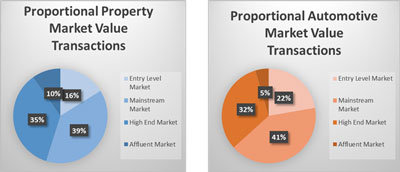The two largest asset purchases with ongoing expenses that typical middle- to high-income consumers are faced with are houses and vehicles. Lightstone, a provider of comprehensive data, analytics and systems on automotive, property and business assets, has identified comparable market segments across properties and vehicles and has seen significant changes in preferences between the two over 2012 and 2013.
"When comparing the value of the transacting market between the first half of 2012 and the first half of 2013 we identified how the asset preferences of consumers in different cities changed from one year to the next. This also provided insight into what we can expect in the first half of 2014, which is uniquely gloomy with the combined effect of an interest rate hike and increased fuel prices driving up living costs and, therefore, diminishing the asset-buying power of consumers," said Paul-Roux de Kock, analytics director of Lightstone.
Lightstone categorises these four markets, namely, Entry Level, Mainstream, High End and Affluent, based on typical details.
"The proportional value of new and second-hand transacting assets over a one-year period shows four markets that are comparable in size over the two asset classes," said De Kock.
Interesting results
"When breaking down these markets per asset in each region, we observe interesting results showing which assets consumers place priority on in different provinces," said De Kock.
In Johannesburg, the affluent and high-end property market picked up speed and it is expected that the mainstream market will follow suit in 2014 as borderline high-end home buyers might opt to stick to the mainstream market in fear of further rate hikes.
"The automotive sector had a slower six months in all four markets, but with consumers feeling the brunt of increased fuel and e-Toll costs in 2014, we expect potential car buyers to drive up activity in the entry-level and mainstream markets at the expense of the high and affluent markets," said De Kock.
In Cape Town there has been a definite drop in the value of transacting passenger vehicles in the higher ends of the market. There has been an anomaly of a 10% increase in the affluent vehicle market, but due to the low volumes of luxury vehicles traded in the region, small increases will be exaggerated.
In the residential property sector, the mainstream and high-end markets were the ones that picked up steam from the first semester of 2012 to the first semester of 2013 with the entry-level market not as active. This potentially indicates a migration up the value ladder in the Cape Town property market, but with the reverse happening in the vehicle market.
In Tshwane, Lightstone saw a similar decline to Johannesburg in the transacting automotive markets and with increased fuel and e-Toll costs, it is expected that there will be similar downgrade trends in the vehicle markets; however it seems that consumers were spending more money in the non-entry-level property markets. This can indicate that there might be a migration up the property value chain similar to Cape Town in the first half of 2014.
"It is apparent that the markets in both sectors are constantly contracting and expanding and that the movement of value traded across markets in the different municipalities will react differently to economic shocks. We will be following the effect of this on the interplaying property and automotive markets closely in the months to come," concluded De Kock.





























